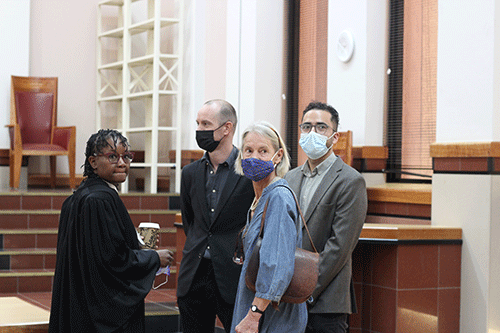The Supreme Court yesterday deferred an application for domicile by a Mexican-born architect, married to a Namibian in a same-sex marriage, back to the home affairs ministry.
Guillermo Delgado had his domicile revoked in 2020 by home affairs after the ministry learned of his same-sex marriage to Phillip Luhl. Delgado then approached the High Court on the strength of his more than 10-year stay in Namibia.
His bid in the High Court was, however, unsuccessful, forcing him to appeal the matter in the Supreme Court. In that judgement, High Court Judge Thomas Masuku dismissed Delgado’s application, saying that a section 38 certificate, which Delgado was issued at the time, was not “sufficient” to establish domicile.
Delgado has been working at Namibia’s University of Science and Technology (NUST) since 2011 on periodical employment permits issued to him.
Before his last employment permit expired in June 2019, he applied for what is known as a renewal or extension certificate, which would allow him entry into Namibia. When he did not get any feedback from home affairs, he enquired and was told it was still pending and he would be informed of the decision telephonically. While on an excursion outside the country in January 2020, he was refused entry into Namibia and was told his application was rejected. He then approached the High Court for remedy and the judge dismissed his application.
Delgado then went to the Supreme Court with the hope of resurrecting his chances to make Namibia his permanent home with his family. During the hearing of the appeal, the three appeal judges who heard the application had some choice words for the home affairs officials over their handling of the matter. Phrases such as “exceptionally appalling, harsh and reminiscent of apartheid years” were uttered by Chief Justice Peter Shivute, Deputy Chief Justice Petrus Damaseb and Judge of Appeal Dave Smuts. Home affairs argued that the certificates issued to Delgado on previous occasions were issued under a mistaken belief that the marriage between Delgado and Luhl was lawful, but as same-sex marriages are not recognised in Namibia, this was not the case. The lawyer representing Delgado argued that he had domicile in Namibia by virtue of his “universal partnership” with a Namibian citizen and he was, therefore, entitled to live and work in the country.
He further claimed that by virtue of Article 18 of the Namibian constitution, he was entitled to be heard before the decision to refuse his application was taken.
Judge Damaseb, who wrote the unanimous judgement, reasoned that while Delgado claims he intends to make Namibia his permanent home, he failed to take the correct steps in acquiring permanent residence. He said that the Act makes it clear that any person entering Namibia with the intent to settle permanently is required to apply for a permanent residence permit, which will be issued if the Immigration Control Board is satisfied that the applicant met specific stringent
requirements.
In this case, the judge said, the fact that the applicant was gainfully employed in Namibia is not sufficient reason to have domicile. However, he said, the appalling and most undignified manner in which Delgado was treated by home affairs was inhumane and a degrading treatment that has no place in a society based on rule of law and other values of inherent dignity as well as justice for all espoused in the Namibian constitution. For this reason, the rejection of the application for Section 38 is set aside and referred back to home affairs to consider the matter afresh. He ordered the ministry to pay the costs of both the applications on an attorney and own client scale.
Uno Katjipuka-Sibolile, who is representing Delgado, on instructions of Nixon Marcus, decried the judgement and said it brings them to the same point again. They apply, the minister refuses, they go to court and the court give the same rulings. The bright side, she said is that the Supreme Court ordered the ministry to pay the costs. Home affairs was represented by advocate Thandazani Griffits Madonsela on instructions of the government attorney. – rrouth@nepc.com.na


